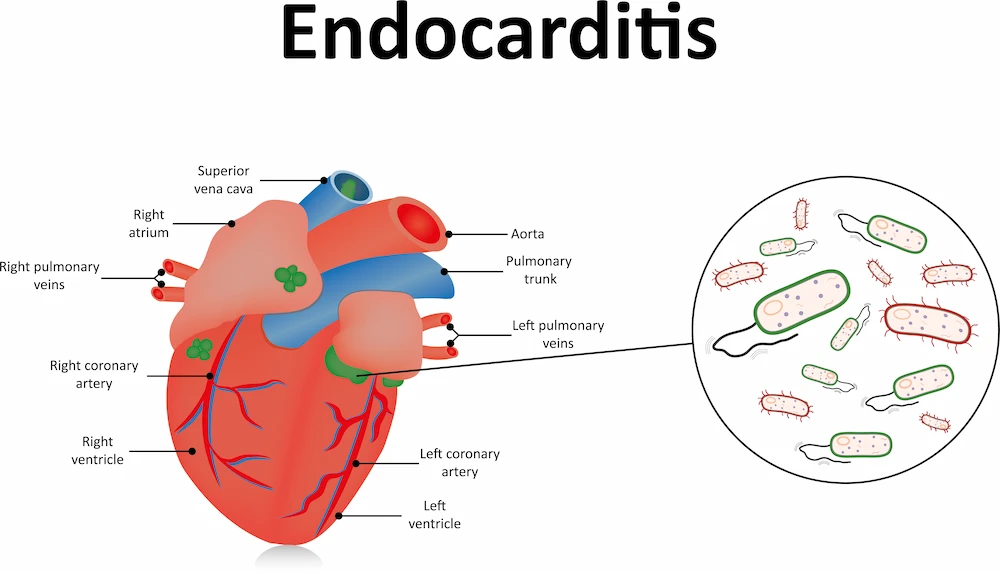What is Endocarditis? A Serious Heart Infection

Endocarditis is a serious infection that affects the inner lining of your heart chambers and valves. While it’s not as common as other heart conditions, it can have life-threatening consequences if left untreated.
This article aims to provide a comprehensive understanding of endocarditis, its causes, symptoms, treatment, and prognosis. We’ll also discuss the importance of seeking timely medical care from a primary care doctor or cardiologist in Miami.
What is Endocarditis?
Endocarditis occurs when bacteria or other germs enter your bloodstream and settle on the inner lining of your heart, particularly the heart valves. This leads to inflammation and the formation of vegetations (clumps of bacteria, blood cells, and other debris) on the valves, which can disrupt blood flow and damage the heart.
Causes of Endocarditis
Endocarditis can be caused by various factors:
- Bacterial Infections: The most common cause is a bacterial infection, often originating from another part of your body, such as your mouth (dental infection), skin, or urinary tract.
- Intravenous Drug Use: Sharing needles or using contaminated needles can introduce bacteria directly into the bloodstream.
- Heart Conditions: People with pre-existing heart conditions, such as damaged heart valves or congenital heart defects, are at a higher risk of endocarditis.
Weakened Immune System: A compromised immune system makes you more susceptible to infections, including endocarditis.

Symptoms of Endocarditis
Endocarditis symptoms can vary depending on the severity of the infection and the individual’s overall health. Common symptoms include:
- Fever: Often the first sign of infection.
- Fatigue and weakness: Due to your body fighting the infection.
- Heart murmur: A new or changed heart murmur, which is an abnormal sound heard during a heartbeat.
- Shortness of breath: Can occur if the infection affects your heart’s ability to pump blood efficiently.
- Chest pain: Might be present if the infection causes inflammation around the heart.
- Other symptoms: Night sweats, chills, weight loss, and joint pain can also occur.
Endocarditis Treatment: Prompt Intervention is Key
Endocarditis treatment typically involves:
- Antibiotics: High doses of intravenous antibiotics are usually necessary to clear the infection. The specific antibiotic used will depend on the type of bacteria causing the infection.
- Surgery: In some cases, surgery might be needed to repair or replace damaged heart valves or to drain abscesses (collections of pus) that might form.
Subacute Bacterial Endocarditis: A Slower-Developing Form
Subacute bacterial endocarditis (SBE) is a less common form of endocarditis that develops more slowly over weeks or months. It’s often caused by less aggressive bacteria and might have milder symptoms initially.
Life Expectancy After Endocarditis: Factors Affecting Prognosis
The prognosis for endocarditis depends on several factors:
- Severity of the infection: Early diagnosis and treatment improve outcomes.
- Underlying health conditions: People with pre-existing heart conditions or weakened immune systems might have a less favorable prognosis.
- Complications: The development of complications like heart failure or stroke can affect long-term outcomes.
Primary Care Doctor and Endocarditis: Early Detection is Crucial
If you experience any symptoms of endocarditis, such as fever, fatigue, or a new heart murmur, it’s important to consult with a primary care doctor or a cardiologist in Miami. They can:
- Evaluate your symptoms and medical history.
- Perform a physical exam, including listening to your heart.
- Order tests, such as blood cultures or an echocardiogram, to confirm the diagnosis.
- Provide a referral to a cardiologist or infectious disease specialist for further management.
Key Takeaways:
- Endocarditis is a serious heart infection that requires prompt medical attention.
- Symptoms can include fever, fatigue, heart murmur, and shortness of breath.
- Treatment typically involves antibiotics and sometimes surgery.
- If you experience any concerning symptoms, consult a primary care doctor in Miami.
Remember, this article is intended for informational purposes only and should not be considered a substitute for professional medical advice. If you have any concerns about your health or suspect you may have endocarditis, consult a qualified healthcare professional.
FAQs: What is Endocarditis?
- How can I prevent endocarditis?
Practice good oral hygiene, including regular dental checkups and cleanings, to reduce the risk of bacteria entering your bloodstream from your mouth. If you have any pre-existing heart conditions, talk to your doctor about preventive measures, such as antibiotics before dental procedures. - What are the signs that my endocarditis might be getting worse?
If your symptoms, such as fever or fatigue, don’t improve with treatment, or if you develop new symptoms like shortness of breath, chest pain, or neurological problems, contact your doctor immediately. - Can endocarditis be cured?
With prompt and appropriate treatment, endocarditis can often be cured. However, severe cases or those with complications might have a less favorable prognosis. Early detection and treatment are crucial for preventing long-term damage to the heart. - What is the life expectancy for someone with endocarditis?
The life expectancy after endocarditis varies depending on several factors, including the severity of the infection, the patient’s overall health, and the presence of any complications. With early diagnosis and treatment, most people can recover fully and have a normal life expectancy. - I’m experiencing some symptoms that might be related to my heart. How can I find a cardiologist in Miami?
Your primary care doctor in Miami can provide a referral to a qualified cardiologist. You can also search online for “cardiologist near me in Miami” or ask for recommendations from friends, family, or your insurance provider.
Contact Us
Hiriart & Lopez MD, LLC
9950 SW 107th Ave STE 101,
Miami, FL 33176
305-274-8779
Phone: (305) 274-8779
Fax: (305) 274-0646
OPENING HOURS
Monday 7:30 AM–4:30 PM
Tuesday 7:30 AM–4:30 PM
Wednesday 7:30 AM–4:30 PM
Thursday 7:30 AM–4:30 PM
Friday 7:30–11 AM
Saturday Closed
Sunday Closed
OFFICE LOCATION
What is Endocarditis? A Serious Heart Infection

Endocarditis is a serious infection that affects the inner lining of your heart chambers and valves. While it’s not as common as other heart conditions, it can have life-threatening consequences if left untreated.
This article aims to provide a comprehensive understanding of endocarditis, its causes, symptoms, treatment, and prognosis. We’ll also discuss the importance of seeking timely medical care from a primary care doctor or cardiologist in Miami.
What is Endocarditis?
Endocarditis occurs when bacteria or other germs enter your bloodstream and settle on the inner lining of your heart, particularly the heart valves. This leads to inflammation and the formation of vegetations (clumps of bacteria, blood cells, and other debris) on the valves, which can disrupt blood flow and damage the heart.
Causes of Endocarditis
Endocarditis can be caused by various factors:
- Bacterial Infections: The most common cause is a bacterial infection, often originating from another part of your body, such as your mouth (dental infection), skin, or urinary tract.
- Intravenous Drug Use: Sharing needles or using contaminated needles can introduce bacteria directly into the bloodstream.
- Heart Conditions: People with pre-existing heart conditions, such as damaged heart valves or congenital heart defects, are at a higher risk of endocarditis.
Weakened Immune System: A compromised immune system makes you more susceptible to infections, including endocarditis.

Symptoms of Endocarditis
Endocarditis symptoms can vary depending on the severity of the infection and the individual’s overall health. Common symptoms include:
- Fever: Often the first sign of infection.
- Fatigue and weakness: Due to your body fighting the infection.
- Heart murmur: A new or changed heart murmur, which is an abnormal sound heard during a heartbeat.
- Shortness of breath: Can occur if the infection affects your heart’s ability to pump blood efficiently.
- Chest pain: Might be present if the infection causes inflammation around the heart.
- Other symptoms: Night sweats, chills, weight loss, and joint pain can also occur.
Endocarditis Treatment: Prompt Intervention is Key
Endocarditis treatment typically involves:
- Antibiotics: High doses of intravenous antibiotics are usually necessary to clear the infection. The specific antibiotic used will depend on the type of bacteria causing the infection.
- Surgery: In some cases, surgery might be needed to repair or replace damaged heart valves or to drain abscesses (collections of pus) that might form.
Subacute Bacterial Endocarditis: A Slower-Developing Form
Subacute bacterial endocarditis (SBE) is a less common form of endocarditis that develops more slowly over weeks or months. It’s often caused by less aggressive bacteria and might have milder symptoms initially.
Life Expectancy After Endocarditis: Factors Affecting Prognosis
The prognosis for endocarditis depends on several factors:
- Severity of the infection: Early diagnosis and treatment improve outcomes.
- Underlying health conditions: People with pre-existing heart conditions or weakened immune systems might have a less favorable prognosis.
- Complications: The development of complications like heart failure or stroke can affect long-term outcomes.
Primary Care Doctor and Endocarditis: Early Detection is Crucial
If you experience any symptoms of endocarditis, such as fever, fatigue, or a new heart murmur, it’s important to consult with a primary care doctor or a cardiologist in Miami. They can:
- Evaluate your symptoms and medical history.
- Perform a physical exam, including listening to your heart.
- Order tests, such as blood cultures or an echocardiogram, to confirm the diagnosis.
- Provide a referral to a cardiologist or infectious disease specialist for further management.
Key Takeaways:
- Endocarditis is a serious heart infection that requires prompt medical attention.
- Symptoms can include fever, fatigue, heart murmur, and shortness of breath.
- Treatment typically involves antibiotics and sometimes surgery.
- If you experience any concerning symptoms, consult a primary care doctor in Miami.
Remember, this article is intended for informational purposes only and should not be considered a substitute for professional medical advice. If you have any concerns about your health or suspect you may have endocarditis, consult a qualified healthcare professional.
FAQs: What is Endocarditis?
- How can I prevent endocarditis?
Practice good oral hygiene, including regular dental checkups and cleanings, to reduce the risk of bacteria entering your bloodstream from your mouth. If you have any pre-existing heart conditions, talk to your doctor about preventive measures, such as antibiotics before dental procedures. - What are the signs that my endocarditis might be getting worse?
If your symptoms, such as fever or fatigue, don’t improve with treatment, or if you develop new symptoms like shortness of breath, chest pain, or neurological problems, contact your doctor immediately. - Can endocarditis be cured?
With prompt and appropriate treatment, endocarditis can often be cured. However, severe cases or those with complications might have a less favorable prognosis. Early detection and treatment are crucial for preventing long-term damage to the heart. - What is the life expectancy for someone with endocarditis?
The life expectancy after endocarditis varies depending on several factors, including the severity of the infection, the patient’s overall health, and the presence of any complications. With early diagnosis and treatment, most people can recover fully and have a normal life expectancy. - I’m experiencing some symptoms that might be related to my heart. How can I find a cardiologist in Miami?
Your primary care doctor in Miami can provide a referral to a qualified cardiologist. You can also search online for “cardiologist near me in Miami” or ask for recommendations from friends, family, or your insurance provider.
Contact Us
Hiriart & Lopez MD, LLC
9950 SW 107th Ave STE 101,
Miami, FL 33176
305-274-8779
Phone: (305) 274-8779
Fax: (305) 274-0646
OPENING HOURS
Monday 7:30 AM–4:30 PM
Tuesday 7:30 AM–4:30 PM
Wednesday 7:30 AM–4:30 PM
Thursday 7:30 AM–4:30 PM
Friday 7:30–11 AM
Saturday Closed
Sunday Closed

